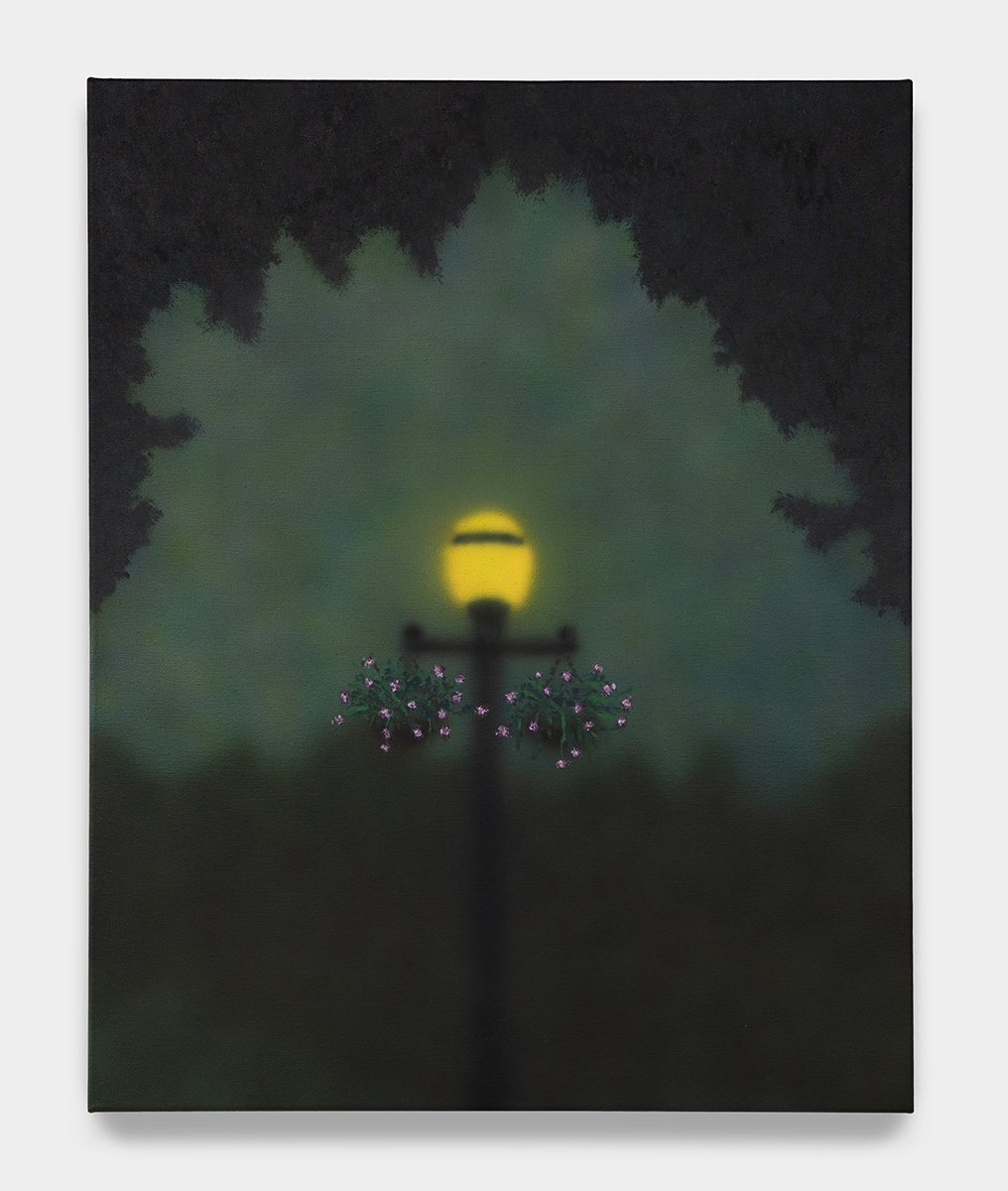Shed your body, reveal itself. It's with and within us, 2021. Acrylic, flashe, and gouache on canvas. 30x 24 inches.⠀⠀⠀
Sung Hwa Kim
BIO
B. 1985, Seoul, South Korea Sung Hwa Kim received his MFA at the Maryland Institute College of Art and his BFA from The Art Institute of Boston. Recent group exhibitions include "Shifted Horizon" at Hesse Flatow (New York, NY); "36 Paintings" at Harper’s Books (East Hampton, NY); "NOCTURNE" on Galleryplatform.LA, M+B (Los Angeles, CA); "RECLAIMING, REIMAGINING" at Field Projects (New York, NY); "The Edge Effect," curated by Akili Tommasino at The Katonah Museum of Art (Katonah, NY); and "COLOR," curated by Jocelyn Miller at Brooklyn Waterfront Artists Coalition (Brooklyn, NY). Sung Hwa Kim lives and works in New York City.
Interview with Sung Hwa Kim
Can you tell us a bit about your background and how you became interested in becoming an artist? Who or what were some of your most important early influences?
I was born in Seoul, South Korea, where I spent my formative years. Then I moved to the States during my teenage years. I remember my junior year in high school we went on a field trip to MoMA. That was my first time experiencing contemporary art. As I was browsing through the museum, I stood in front of this large-scale, vibrant yellowish-orange painting. To this day I still remember that feeling clearly, it felt like something hit me so hard internally and I couldn’t leave the room. I didn’t talk to my classmates or pass by the work. I just stood there, it was almost like the work itself is pulling me in with force and I had to stare at it for a while. At the time, I didn’t understand why or what I was looking at. I had not drawn or painted growing up, and I wasn’t known for having any extraordinary artistic talent as a child. All I knew was that it made me want to do something the very next day. That’s when I first began to paint. Thank you, Mark Rothko!
Nocturne: On the day when your long night ends, I will be there, 2021. Acrylic, flashe, and gouache on canvas, 30x24 inches.
Where are you currently based and what initially attracted you to working in this place? Are there any aspects of this specific location or community that have inspired aspects of your work?
I’m currently based in Brooklyn, New York. I’ve been here for about eight years, which is somewhat crazy now that I think about it because originally, I just came here to stay for two months. My mentor at the time asked me if I could house sit and water her plants while she’s away (she’s got like 5+ plants, no joke). It’s not like I was doing anything at that time, so I came here with just two duffel bags, one suitcase, and maybe $500 in my bank account.
What I experienced during those two months is that people in New York are filled with energy and passion. It’s a city full of so many beautiful, talented minds from all over the world that will constantly motivate you. Also, there is just so much amazing art you can experience in person that is available for you whenever you want it. I fell in love with the city and that’s when I said, okay, I’m gonna give it a try for a year and we’ll see how it goes, I’ve been here ever since then, and I just can’t stay away—hahaha.
Can you describe your studio space? What are some of the most crucial aspects of a studio that make it functional? Do any of these specific aspects directly affect your work?
Last April, my apartment building caught on fire, and I had to move out fast… That’s when I decided to try the live-work thing. So, currently my studio and apartment are one space. At first, I was a bit nervous because it’s difficult to stay away from your work when you live with it everyday. I had to build mental walls and try not to look at the work when I was doing everyday stuff. But now I’m used to it and I can coexist with the work. There are definitely pros and cons, but one of the best parts about working from your home is that I can start working at 4 am or paint until midnight and not worry about getting home. Also, It’s been helpful to see my paintings outside of a traditional studio or gallery space. It helps me to imagine what other people might experience when they have them in their living spaces.
What is a typical day like? If you don't have a typical day, what is an ideal day?
Every day is somewhat different, but I normally start painting late at night or at dawn. There’s something about the sun being down, the city asleep, and still being awake and working. I tend to focus better and not get too distracted or excited about the things around me.
Nocturne: My love, hope, and sweet dreams. I'm still here and that is all that matters, 2021. Acrylic, flashe, and gouache on canvas, 60x 48 inches.⠀
What gets you in a creative mindset?
I’d say just wandering around the city gets me in a creative mindset. Sometimes I feel like I’m an image/moment collector. I’ll bike or walk around aimlessly and just search for certain moments or scenes to spark my interest.
If I know what I’m going to work on that day, then I just go right to it. I used to listen to music or a podcast, but now I don’t like to listen to anything while I paint. I realized that subconsciously I’m affected by the songs or stories, and it might interrupt the feelings I’m trying to evoke or the mood I’m trying to create. I enjoy the silence and stay in a neutral state of mind as much as possible.
What criteria do you follow for selecting materials? How long have you worked with this particular media or method?
I’ve been using acrylic, gouache, and flashe for some time now and they all do different things on the surface of the painting. There have definitely been some trial-and-error moments throughout the years, and I have explored many different brands. I think I’ve found what I was looking for, which is how they sit on the surface and whether they reflect or absorb light. Other than that, I’m usually open to trying any new mediums to create work. There’s always room to learn something new.
Can you walk us through your overall process? How long has this approach been a part of your practice?
It usually starts with certain scenes or moments I’ve experienced while I go around the city. I don’t like to force things, but rather listen to my intuition, if a particular moment sticks out or stays with me throughout the day then I try to pay attention to that. It’s essential to my practice to be actively attentive and open and receptive to the world around me. Sometimes I will record the moment with video or sometimes sound so I don’t forget the feeling it invoked or the air of the space. Certain paintings I sketch first just to see the composition, but there are other paintings I just dive right in. I’m always trying to strike a balance between knowing and not knowing. This requires a bit of faith and trust in the process and relinquishing of control. The beauty of painting is that sometimes during the process of making it, the work itself reveals something to you, something you never expected to see. I love these moments because they always surprise you.
Nocturne: One day I’ll become a star in the night sky and protect you forever, 2021. Acrylic, flashe, and gouache on canvas, 30x24 inches.
Can you talk about some of the ongoing interests, imagery, and concepts that have informed your process and body of work over time? How do you anticipate your work progressing in the future?
Lately, I’ve been working on the solitary scenes that point to beacons of hidden light and play under the cover of darkness. Hoping to propose different ways of looking, slower, closer, outward, and above all, introspectively. The subjects I choose to paint such as flowers, weeds, butterflies, the moon are all things that relate to mortality. It helps me to be humble and to live every moment to the fullest, because everything is temporary, and nothing is permanent. I want to examine our surroundings while contemplating a newfound, heightened awareness of self, being, and co-existing with the environment. I think having ideas is kind of like planting seeds. Our brain is constantly working without our awareness, so when I get certain ideas I plant them somewhere in my brain and let them do the work. After a while I go back to them and try to remember the feelings of these moments. What stayed in my mind is what will resonate in a painting.
As a result of the pandemic, many artists have experienced limited access to their studios or loss of exhibitions, income, or other opportunities. Has your way of working (or not working) shifted significantly during this time? Are there unexpected insights or particular challenges you’ve experienced?
For sure. My work has definitely changed since the pandemic. I haven’t told many people, but at that time I was seriously considering stop producing art for good. Things hit me hard emotionally and financially. In the beginning, I couldn’t make anything. I felt that it was all meaningless. The infinite weight crushed me inside and all I can see ahead is pure darkness. I spoke to my parents and thought of moving back home to be with them and regroup to search for something new. Then one night on my usual late-night bike ride, I saw the moonlight that appeared from the dark sky. For some strange reason that comforted me. It was almost like telling me that the new morning will arrive no matter how difficult it might feel at the moment. That’s when the “Nocturne” series started. It was almost like squeezing the last drop of my mental energy at that time. I wanted to make something that showed my empathy towards things that we’ve lost and capture the moments of hope to ease our minds. Looking back now, I think the work itself guided me to the better side.
Can you share some of your recent influences? Are there specific works—from visual art, literature, film, or music—that are important to you?
There are just way too many but to name a few artists that I go back often to look at: Vuillard, Bonnard, Whanki Kim, Magritte, van Gogh, Kawase Hasui, and Klimt.
With literature, I've been reading a lot of poetry lately. “I see you like a flower” by Na Tae-joo, “Mindfulness poem” by Ryu Si-Hwa, and “Sky, Wind, Stars and Poetry” by Yun Dong- Ju.
Nocturne: Last night’s dream and unspoken feelings, 2021. Acrylic, flashe, and gouache on canvas, 30x24 inches.
Who are some contemporary artists you’re excited about? What are the best exhibitions you’ve seen in recent memory and why do they stand out?
I’m really looking forward to seeing Alex Katz's retrospective at The Guggenheim this year.
Do you have any tips or advice that someone has shared with you that you have found particularly helpful?
Everything counts, everything you do counts.
What are you working on in the studio right now? What’s coming up next for you?
At the moment I’m preparing for my first solo in June, hopefully, you guys can stop by!
Anything else you would like to share?
I just want to say Thank You! :)
To find out more about Sung Hwa Kim check out his Instagram and website.





